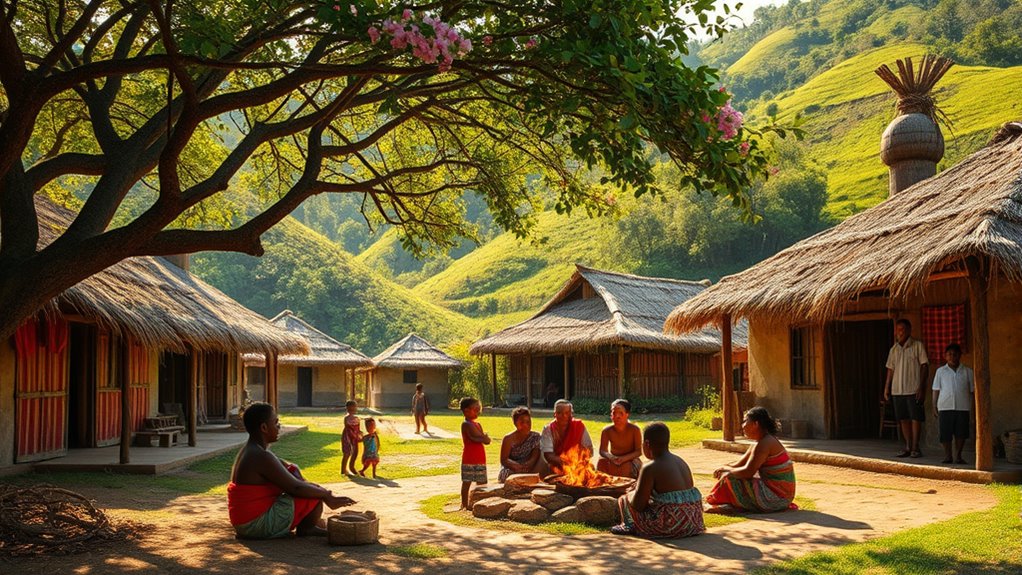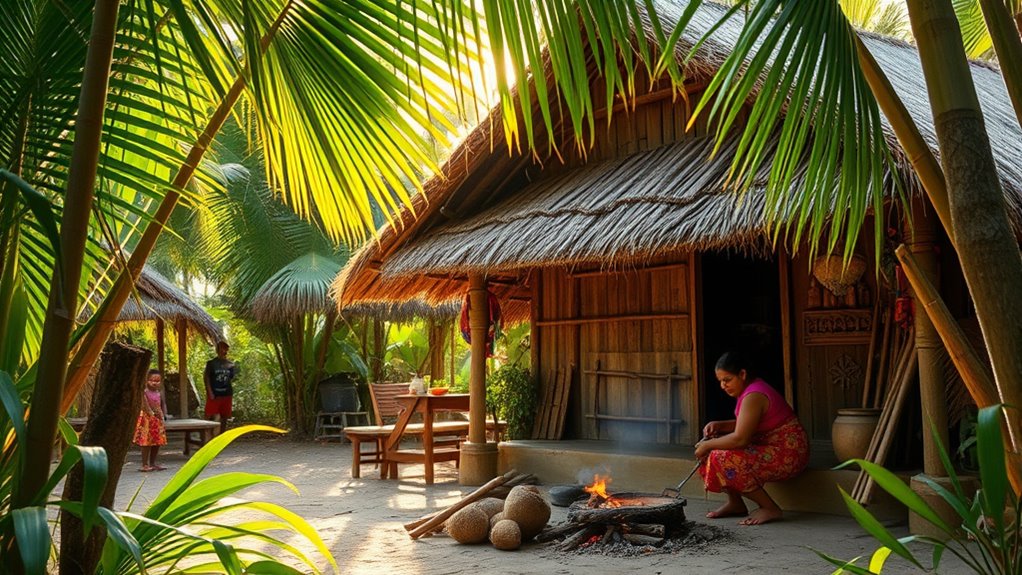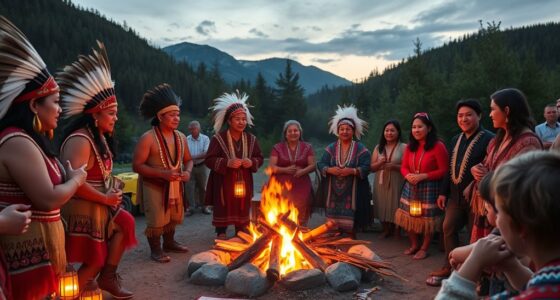Participating in homestays with indigenous communities offers you an authentic, responsible travel experience. You get to actively engage in daily routines, learn traditional practices, and respect local customs. This supports cultural preservation, environmental sustainability, and community development. As a respectful guest, you help preserve indigenous identities while minimizing ecological footprints. If you want to discover how your travel choices can positively impact communities and the environment, there’s more to explore.
Key Takeaways
- Homestays enable authentic cultural immersion and active participation in indigenous traditions and daily routines.
- They promote the preservation of indigenous customs and prevent cultural commodification.
- Homestays support eco-friendly practices, reducing environmental impact and conserving local ecosystems.
- They provide vital economic benefits, empowering communities through sustainable tourism income.
- Responsible homestays foster respectful cultural exchange and long-term community resilience.

Have you ever considered staying with indigenous communities to truly experience their culture? Homestays offer a unique opportunity to go beyond typical tourist attractions and immerse yourself in authentic local life. When you choose to live with indigenous families, you’re not just observing traditions from a distance—you’re actively participating in daily routines, sharing meals, and learning firsthand about their customs. This form of responsible travel promotes cultural preservation by fostering direct connections and mutual respect. It helps guarantee that indigenous traditions are valued and kept alive, rather than eroded by commercial tourism. By staying in these communities, you contribute to sustainable tourism that benefits local people economically and socially, encouraging them to maintain their heritage rather than abandoning it for outside development.
Participating in homestays allows you to witness how indigenous practices are intertwined with their environment, which is often overlooked in mass tourism. You might learn traditional weaving, farming techniques, or participate in ceremonial activities. These experiences deepen your understanding of their history and worldview, while also empowering the community to share their stories on their terms. This approach minimizes the environmental impact of travel since homestays typically have a smaller ecological footprint than large resorts or hotels. You’re more likely to stay in eco-friendly accommodations that prioritize conservation and resource management, aligning with principles of sustainable tourism. By supporting these small-scale initiatives, you help secure natural habitats and reduce the strain on local resources, ensuring that the community’s environment remains healthy for future generations.
Participating in homestays fosters eco-friendly practices and preserves natural habitats for future generations.
Additionally, engaging with indigenous communities through natural techniques for sustainable practices enhances your appreciation for their connection to the land and resources. Staying with indigenous families encourages cultural exchange that benefits everyone involved. You’re not just a visitor; you become a guest who respects and honors local traditions. Many communities rely on tourism as a crucial source of income, but the key is responsible engagement. When travelers are mindful of their impact, they help prevent the commodification or dilution of indigenous culture. Instead, they foster a sense of pride and ownership within the community to preserve their identity. This mutual respect promotes a sustainable model of tourism that aligns economic needs with cultural preservation.
Ultimately, homestays with indigenous communities offer a meaningful way to travel consciously and responsibly. You get to experience the richness of their culture directly while supporting initiatives that prioritize environmental stewardship and cultural continuity. It’s a powerful reminder that responsible travel is about more than sightseeing—it’s about forming genuine connections and ensuring that the communities you visit can thrive and preserve their heritage for generations to come.
Frequently Asked Questions
How Can I Ensure My Visit Benefits the Indigenous Community?
To guarantee your visit benefits the indigenous community, engage in community involvement by participating in local activities, respecting traditions, and supporting their initiatives. Opt for homestays that prioritize economic empowerment, making sure your money directly supports community members. Avoid exploitative practices and choose responsible tour operators. By doing so, you help foster sustainable development, preserve cultural heritage, and create meaningful connections that genuinely benefit the community beyond your visit.
Are Homestays Culturally Appropriate and Respectful to Local Traditions?
Yes, homestays can be culturally appropriate and respectful if you practice cultural sensitivity and respect traditional practices. You should learn about local customs before your visit and ask permission before participating in traditional activities. Show genuine interest and listen carefully to community members’ guidance. By doing so, you help preserve their traditions and ensure your stay benefits the community while honoring their way of life.
What Safety Precautions Should I Take During My Stay?
Did you know travelers face a 10% higher risk of illness abroad? To stay safe, always have thorough travel insurance and check health precautions beforehand. Carry necessary medications, stay hydrated, and avoid risky foods. Respect local safety guidelines, be aware of your surroundings, and communicate with hosts about any concerns. Planning ahead ensures your experience remains positive and secure, so you can enjoy authentic cultural exchanges without worry.
How Do I Choose an Authentic and Ethical Homestay Experience?
To choose an authentic and ethical homestay, you should look for community involvement and cultural sensitivity. Research the community’s initiatives, read reviews, and make certain they prioritize local empowerment. Select a homestay that actively supports local projects and respects traditions. Engage respectfully, ask questions about customs, and be open-minded. This approach guarantees an enriching experience that benefits both you and the community, fostering genuine connections and responsible travel.
What Are the Environmental Impacts of Staying in Indigenous Communities?
Staying in indigenous communities can reduce your ecological footprint by supporting local economies and sustainable practices. However, it’s essential to be mindful of waste management, as improper disposal can harm the environment. Your presence may strain local resources if not managed properly. To minimize impacts, follow community guidelines, reduce waste, and choose eco-conscious accommodations, helping preserve the environment while enjoying an authentic cultural experience.
Conclusion
Stepping into an indigenous homestay, you’ll feel the warmth of woven blankets and hear stories etched into every corner of the home. As you share meals under star-lit skies, you become part of a vibrant tapestry of traditions and respect. Your responsible journey leaves footprints of appreciation on sacred lands, creating memories as timeless as the mountains or rivers you explore. Embrace this experience—you’re not just a visitor, but a guardian of culture.







